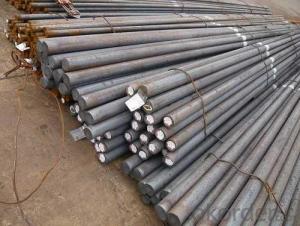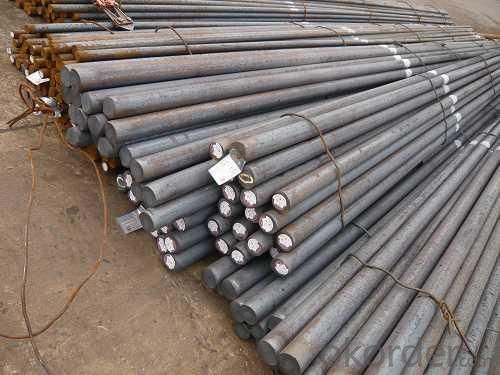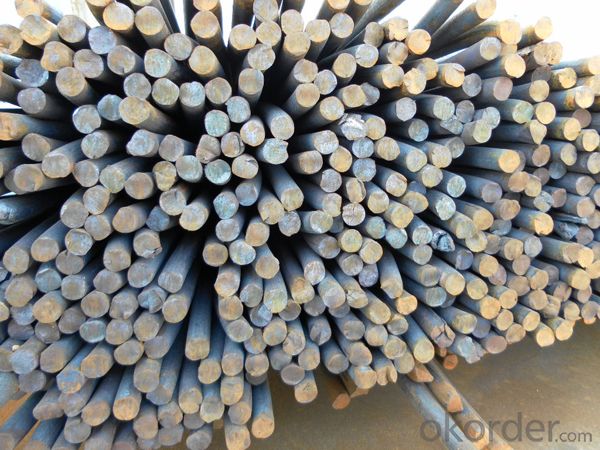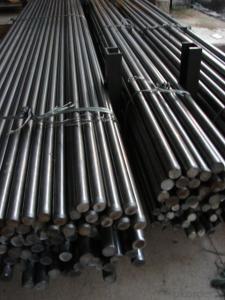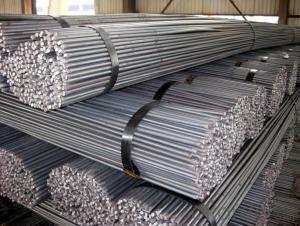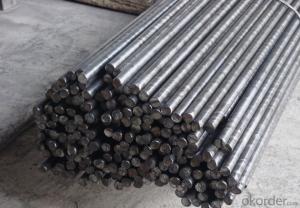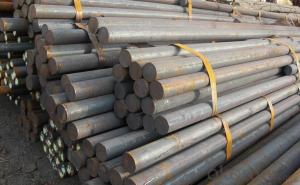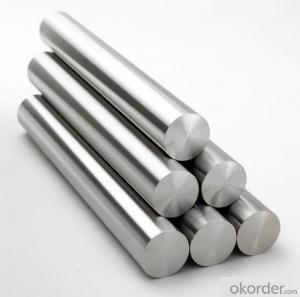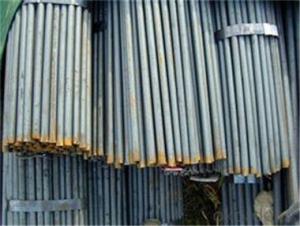GB 45#/SAE 1045 Steel Round Bar 28mm/30mm
- Loading Port:
- China main port
- Payment Terms:
- TT or LC
- Min Order Qty:
- 50 m.t
- Supply Capability:
- 10000 m.t/month
OKorder Service Pledge
OKorder Financial Service
You Might Also Like
GB 45#/SAE 1045 Steel Round Bar 28mm/30mm
Description:
-Specification: 28mm/30mm
-Length: 6m/12m
-Standard: GB/SAE/Japanese Standard
-Material: GB 45#/SAE1045/S45C
Chemical Composition of GB 45#/SAE 1045 Steel Round Bar 28mm/30mm:
| C | Si | Mn | P | S | Ni | Cr | Cu |
| 0.42-0.50 | 0.17-0.37 | 0.50-0.80 | ≤0.035 | ≤0.035 | ≤0.30 | ≤0.25 | ≤0.25 |
Packaging & Delivery of GB 45#/SAE 1045 Steel Round Bar 28mm/30mm:
Packaging Detail: All goods are packed in bundle with steel strips and shipped by break bulk vessel or container (depend on target market and different ports)
Delivery Detail: 45 days
MOQ: 50 tons per specification; we can negotiate the quantity if the specification is normal or we have stock of one specification.
Weight: The price invoicing on theoretical weight basis or actual weight basis depends on customer’s request.
Shipment: The shipment of bulk break or container is depends on customer’s request and the situation of the port of destination.
Documents given: Full set of original clean on board bill of lading; Original signed commercial invoice; Original packing list; Policy of insurance; Certificate of origin and what the target market needs.
Payment:
-Invoicing on theoretical weight or actual weight a s customer’s request.
-FOB, CFR or CIF.
-Regular terms of payment:
1, 30% payment in advance, the remaining balance (70% payment) against the copy of B/L.
2, 30% payment in advance, the remaining balance (70% L/C) against the copy of B/L.
3, Negotiable.
Images of GB 45#/SAE 1045 Steel Round Bar 28mm/30mm:
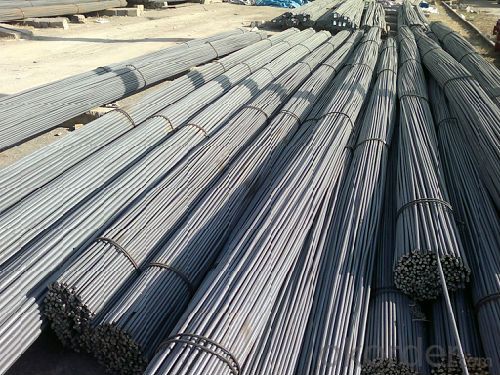
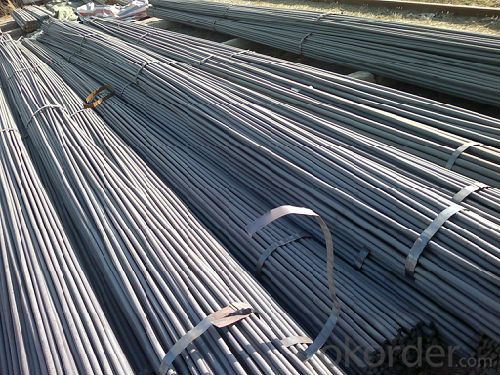
*If you would like to get our price, please inform us the size, standard/material and quantity. Thank you very much for your attention.
- Q: What is the difference between a solid steel round bar and a hollow steel round bar?
- A solid steel round bar is a cylindrical metal rod that has a uniform diameter throughout its entire length. It is made of solid steel, meaning it does not have any hollow or empty space inside. On the other hand, a hollow steel round bar also has a cylindrical shape but contains a hollow or empty space within its center. This hollow space can vary in size, depending on the specific design and purpose of the hollow round bar. The main difference between the two lies in their structural integrity and weight-bearing capacity. A solid steel round bar offers greater strength and stability compared to a hollow steel round bar. This is because the solid bar is made of a continuous steel material, making it more resistant to bending, twisting, or deforming under pressure. It is commonly used in applications where high strength and durability are required, such as construction, engineering, and manufacturing industries. In contrast, a hollow steel round bar may have reduced strength and load-bearing capacity due to the presence of the hollow space within. However, the hollow design provides certain advantages in terms of weight, cost, and flexibility. The hollow space allows for a lighter overall weight of the bar, making it more suitable for applications where weight is a critical factor, such as aerospace or automotive industries. Additionally, the hollow space can be utilized for various purposes, such as passing through electrical wires or fluids, providing a channel for ventilation, or even reducing material costs by using less steel. Ultimately, the choice between a solid steel round bar and a hollow steel round bar depends on the specific requirements of the application. If strength and stability are paramount, a solid bar would be the preferred choice. Conversely, if weight reduction, cost-efficiency, or additional functionality is desired, a hollow bar may be more suitable.
- Q: Can steel round bars be used for making connecting rods?
- Certainly, connecting rods can be crafted using steel round bars. These rods play a crucial role in internal combustion engines, necessitating robustness and endurance to endure the engine's operational forces and stresses. Steel round bars, often composed of alloy steel, exhibit exceptional mechanical traits, including elevated tensile strength, hardness, and resistance to fatigue. Consequently, they prove suitable for this purpose. Additionally, steel round bars can be conveniently machined and molded into the necessary dimensions and specifications demanded by connecting rods. As a result, employing steel round bars emerges as a widespread and dependable option for fabricating connecting rods in industries such as automotive and others.
- Q: What are the different types of steel round bar alloys used in the aerospace industry?
- In the aerospace industry, various steel round bar alloys are commonly used to meet the specific demands of different applications. These alloys have been specifically designed to meet the rigorous requirements of the aerospace sector, including the need for high strength, corrosion resistance, and lightweight properties. 1. Stainless Steel: Among the alloys used in aerospace applications, stainless steel stands out as one of the most popular choices. It possesses excellent corrosion resistance, high strength, and good heat resistance. Aircraft components like landing gear, fasteners, and engine parts often employ this alloy. 2. Titanium Alloy: Due to its exceptional strength-to-weight ratio, titanium alloys find widespread use in the aerospace industry. They offer excellent corrosion resistance, good fatigue strength, and can withstand high temperatures. Aircraft frames, engine components, and landing gear often utilize titanium alloys. 3. Aluminum Alloy: Aerospace applications benefit from the lightweight nature and excellent mechanical properties of aluminum alloys. These alloys possess good corrosion resistance and are commonly used in aircraft structures, wings, and fuselage components. 4. Nickel Alloy: Known for their high strength and exceptional resistance to extreme temperatures, nickel alloys are frequently employed in aerospace applications. They are critical in environments requiring resistance to heat, wear, and corrosion, such as turbine engines and exhaust systems. 5. High-Strength Low-Alloy (HSLA) Steel: HSLA steels are renowned for their high strength and weldability. They offer good toughness and impact resistance, making them ideal for aerospace applications where durability and strength are essential, such as in landing gear and structural components. In summary, the aerospace industry employs a combination of these steel round bar alloys to cater to the specific requirements of different components and applications. Each alloy possesses unique properties that render it suitable for specific aerospace applications, ensuring the safety, reliability, and performance of aircraft in the demanding aerospace environment.
- Q: What are the advantages of using free-cutting steel round bars?
- There are several advantages to using free-cutting steel round bars. Firstly, they offer improved machinability, which means they can be easily and efficiently machined into various shapes and sizes without excessive tool wear or power consumption. This leads to increased productivity and reduced manufacturing costs. Additionally, free-cutting steel round bars have excellent chip formation properties, resulting in better surface finish and dimensional accuracy of the machined parts. They also exhibit enhanced surface hardness and wear resistance, making them suitable for applications that require durability and strength. Lastly, these bars are readily available and cost-effective, making them a preferred choice for many industries.
- Q: How do steel round bars compare to copper round bars?
- Different applications call for distinct properties in steel and copper round bars. To begin with, steel round bars are known for their remarkable strength and durability. This versatile material can withstand high levels of stress, making it perfect for structural and industrial uses. With its high tensile strength, steel can resist pulling forces without breaking. Construction projects, automotive components, and machinery manufacturing frequently rely on steel round bars. On the other hand, copper round bars possess unique characteristics that set them apart from steel. Copper is an exceptional conductor of heat and electricity, making it indispensable in electrical wiring and plumbing systems. Its high resistance to corrosion makes copper pipes widely used in plumbing applications. Additionally, copper's antimicrobial properties make it a preferred material for medical equipment and food processing industries. When it comes to cost, steel round bars tend to be more affordable than copper round bars. Steel is abundantly available and has lower production costs compared to copper. This cost advantage makes steel a popular choice for budget-conscious applications. In terms of appearance, steel round bars have a sleek, metallic finish, while copper round bars exhibit a distinct reddish-brown appearance. This visual distinction often influences the selection of materials in architectural and decorative applications. In summary, steel round bars and copper round bars possess different properties that suit them for specific purposes. Steel offers exceptional strength and durability, making it suitable for structural and industrial applications. Copper, on the other hand, is valued for its conductivity, corrosion resistance, and antimicrobial properties, making it ideal for electrical, plumbing, and medical applications. The choice between steel and copper depends on the specific requirements of the project and the desired properties of the material.
- Q: What are the advantages of using carbon steel round bars?
- There are several advantages to using carbon steel round bars in various applications. Firstly, carbon steel round bars are known for their high strength and durability. They have a high tensile strength, making them suitable for heavy-duty applications that require withstanding significant loads and pressures. This makes carbon steel round bars ideal for use in construction, manufacturing, and engineering industries. Another advantage of carbon steel round bars is their excellent machinability. They can be easily cut, drilled, and shaped into various forms, making them versatile for different projects. This also allows for precise and accurate fabrication, ensuring that the desired specifications and dimensions are achieved. Carbon steel round bars also offer good weldability, which means they can be easily joined together using various welding techniques. This makes them a preferred choice in the construction of structures and machinery that require strong and secure connections. Additionally, carbon steel round bars are relatively cost-effective compared to other materials with similar properties. They offer an excellent balance between performance and affordability, making them a popular choice for many applications. Moreover, they have a long lifespan and require minimal maintenance, resulting in cost savings over time. Carbon steel round bars are also highly resistant to corrosion and wear. This is due to the presence of carbon and other alloying elements, which enhance their resistance to external factors such as moisture, chemicals, and abrasion. As a result, carbon steel round bars can withstand harsh environments and prolonged exposure to various elements, making them suitable for outdoor applications. Lastly, carbon steel round bars are readily available in the market due to their widespread use and popularity. They are available in various sizes, grades, and specifications, allowing users to select the most suitable option for their specific needs. This availability ensures ease of sourcing and reduces lead times for projects. In conclusion, the advantages of using carbon steel round bars include their high strength, excellent machinability, good weldability, affordability, corrosion resistance, and availability. These qualities make carbon steel round bars a reliable and versatile choice for a wide range of applications in different industries.
- Q: Can steel round bars be used in the production of shafts?
- Yes, steel round bars can be used in the production of shafts. Steel round bars are commonly used in shaft manufacturing due to their high strength, durability, and ability to withstand heavy loads and torsional forces. They can be machined and shaped into the desired dimensions and specifications required for shafts in various industries such as automotive, aerospace, machinery, and construction.
- Q: What are the advantages of using nickel-chromium-titanium alloy steel round bars?
- There are several advantages of using nickel-chromium-titanium alloy steel round bars: 1. High Strength: Nickel-chromium-titanium alloy steel round bars are known for their exceptional strength and durability. They have a high tensile strength, making them suitable for applications requiring heavy-duty materials. 2. Corrosion Resistance: These alloy steel round bars have excellent corrosion resistance properties due to the presence of nickel and chromium. This makes them ideal for use in environments where exposure to moisture, chemicals, or harsh conditions is common. 3. Heat Resistance: Nickel-chromium-titanium alloy steel round bars can withstand high temperatures without losing their mechanical properties. They exhibit good heat resistance, making them suitable for applications in industries such as aerospace, power generation, and automotive. 4. Fatigue Resistance: The unique composition of nickel-chromium-titanium alloy steel round bars provides excellent fatigue resistance, allowing them to withstand repeated stress and load cycles without deformation or failure. This makes them suitable for applications in high-stress environments. 5. Machinability: Despite their high strength and toughness, nickel-chromium-titanium alloy steel round bars are relatively easy to machine. They can be easily cut, drilled, or shaped, allowing for efficient and precise manufacturing processes. 6. Versatility: These alloy steel round bars have a wide range of applications due to their versatile properties. They can be used in industries such as construction, automotive, aerospace, marine, and many more. Their high strength and corrosion resistance make them suitable for various structural and load-bearing applications. Overall, nickel-chromium-titanium alloy steel round bars offer a combination of high strength, corrosion resistance, heat resistance, fatigue resistance, machinability, and versatility, making them a preferred choice for many industrial applications.
- Q: How are steel round bars measured and specified?
- Steel round bars are measured and specified based on their diameter, which is typically expressed in millimeters or inches. The measurement is taken across the widest point of the circular cross-section of the bar. In addition to the diameter, the length of the bar is also specified. The measurements and specifications are crucial in determining the appropriate size and quantity of steel round bars required for a particular application or project.
- Q: What is the corrosion resistance of steel round bars?
- The corrosion resistance of steel round bars depends on the type of steel and the environmental conditions they are exposed to. Generally, stainless steel round bars offer excellent corrosion resistance due to the presence of chromium, which forms a protective oxide layer on the surface of the steel. This oxide layer acts as a barrier, preventing further corrosion from occurring. However, carbon steel round bars are more susceptible to corrosion, especially in environments with high moisture or exposure to corrosive substances. In these cases, additional protective measures such as coatings or galvanizing may be required to enhance their corrosion resistance. It's important to note that the performance of steel round bars in corrosive environments also depends on various factors like temperature, pH level, and the presence of other elements or chemicals. Therefore, it is recommended to consider the specific application and consult with corrosion experts to determine the most suitable steel grade and corrosion protection measures for your needs.
Send your message to us
GB 45#/SAE 1045 Steel Round Bar 28mm/30mm
- Loading Port:
- China main port
- Payment Terms:
- TT or LC
- Min Order Qty:
- 50 m.t
- Supply Capability:
- 10000 m.t/month
OKorder Service Pledge
OKorder Financial Service
Similar products
Hot products
Hot Searches
Related keywords
